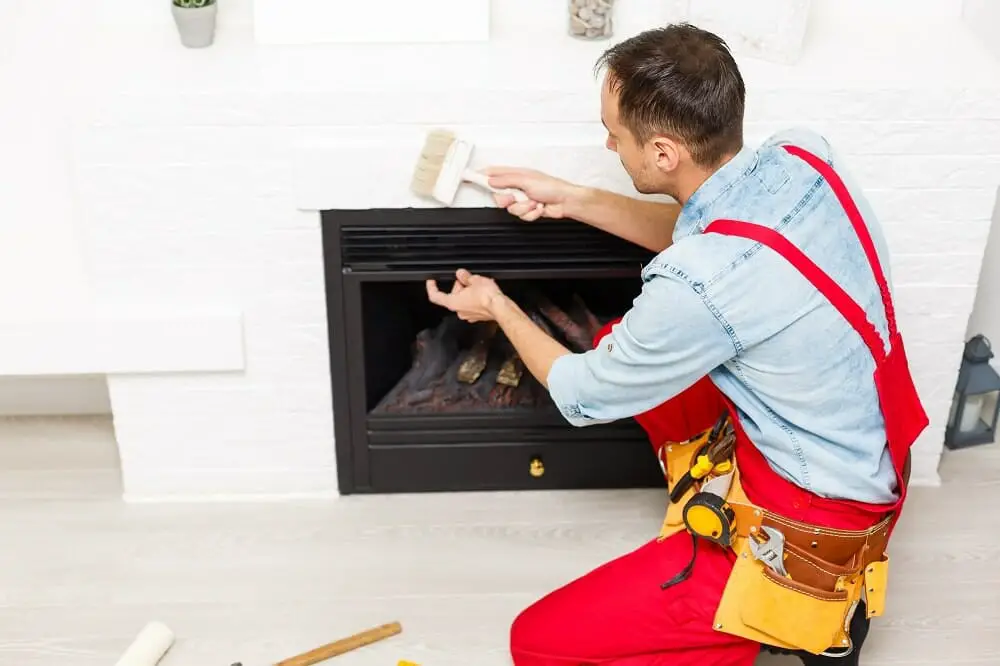Some common ways to figure out if your gas fireplace is leaking:
- The fireplace does not light
- Your home methane detector alarm is blaring
- Your carbon monoxide detectors start going nuts
- A rotten eggs or gas odor smell pervades the home
- You hear a hissing sound around your fireplace
- Try spraying soapy water ir Windex on the valve- you’ll see bubbles forming if there’s a leak (Do this before turning the gas off to the fireplace)
The worst season of the year is winter. A gas fireplace, though, will improve everything because of the warm air it produces.
The two forms of gas fuel utilized in gas fireplaces are propane and natural gas. The best fuel is natural gas because it is less expensive and generates more heat than propane.
Gas fireplaces, however, can also leak gas. This is an extremely risky position that could have terrible consequences.
Despite the fact that gas fireplaces don’t leak gas frequently, it does happen occasionally, according to research. Gas leaks are extremely combustible and might make you sick.
But how can you tell if your fireplace is leaky? Many homeowners who own gas fireplaces ask this question. Although there is no one technique to spot a gas leak, you should keep an eye out for various symptoms, such as changes in your body.
Contents
- How can I tell if the gas in my fireplace is leaking?
- 1. Hissing noise
- 2. When rotten eggs are in the air
- 3. The bubble test
- 4. Carbon monoxide detectors
- Is the smell of gas coming from a gas fireplace normal?
- Gas fireplace inspection
- Gas fireplace inspections are labor-intensive
- Check for glass cracks
- Examine the gas logs
- Then check the ignition
- Inside, vacuum up pet hair, dust, and dead bugs.
- How Much Does it Cost to Fix a Gas Fireplace That Is Leaking?
- Conclusion
How can I tell if the gas in my fireplace is leaking?
Since gas can’t be seen, you need to be very careful and watch out for the signs listed below.
1. Hissing noise
The most obvious indication that your gas fireplace is leaking gas is this. If you hear a hissing sound, you should worry because it means there is a big leak.
Turn off all of your home’s electrical devices, including the candles. Then proceed to close the main valve that connects to your home’s gas system. Call the gas company after that.
2. When rotten eggs are in the air
Natural gas and propane both include the chemical mercaptan to give them a distinct aroma. This is the stench of sewage or rotting eggs. When you notice this stench in your home and are certain there are no rotting eggs around, immediately shut off the main valve. When all fire starters have been extinguished, contact the experts.
3. The bubble test
This is a way to find out if the gas is leaking. Make sure all electrical appliances are turned off and all windows and doors are open before attempting to employ this procedure.
Put on a face mask because natural gas and propane are hazardous to your health. The gas must be turned on for this method to work.
A pail of clean water should have a few drops of dish soap added to it. Wipe the suspected area after dipping a piece of cloth or a sponge in the soapy water. When bubbles start to appear, you have a gas leak.
4. Carbon monoxide detectors
When you have a gas fireplace in your home, it is wise to install natural gas detectors. Once the detector sounds, you will be aware that your fireplace system has a gas leak someplace.
For speedy response, some natural gas detectors are connected to the gas provider. Never forget to replace the detectors’ batteries.
Is the smell of gas coming from a gas fireplace normal?
Yes, if you have a gas fireplace, it is typical to smell gas. But watch out that the smell doesn’t become overwhelming. According to experts, a gas scent indicates a functioning gas fireplace. Because they lack a chimney, ventless gas fireplaces are the ones that vent the most gas.
A gas leak can be detected with a carbon monoxide detector.
No, a gas leak cannot be found using a carbon monoxide detector. This is a typical misunderstanding. Use a natural gas detector if you wish to find a gas leak. However, several manufacturers now make a single product that has both detectors. As suggested, buy a machine that can do both jobs.
Gas fireplace inspection

Gas fireplace inspections are labor-intensive
You must inspect the fireplace from the outside in. Check the unit’s frame installation. Check for gaps around the fireplace.
Check for glass cracks
Temperature changes can break glass. Cleaning glass with vinegar or alcohol Check the glass door‘s airtightness. If required, use silicone caulk.
Examine the gas logs
Porcelain logs add style to a gas fireplace. Logs fade over time. Replace them without replacing the whole fireplace.
Then check the ignition
This device is under gas logging. Check the fire’s ignition. Once the lighting is good, clean the valves and ports under the logs. Steel wool cleans valves and ports. Bubble-test valves for gas leaks.
Inside, vacuum up pet hair, dust, and dead bugs.
Look for condensation in your gas fireplace’s chimney. This is a gas fireplace’s biggest threat. Damp marks on chimney walls and ceiling stains indicate condensation.
How Much Does it Cost to Fix a Gas Fireplace That Is Leaking?

A gas fireplace leak typically costs between $150 and $800 to repair. However, if the leak is in a region that needs excavation and is inaccessible, the price could increase to $2,000 or more. For this reason, it’s a good idea to cover gas leaks and repairs with your insurance.
Conclusion
Gas leaks from gas fireplaces can be quite harmful. Bad health issues like headaches, nausea, dizziness, and vomiting might result from a gas leak. Keep an eye out for the warning signs listed above, and don’t forget to close the main valve and contact experts to handle any leaks.
